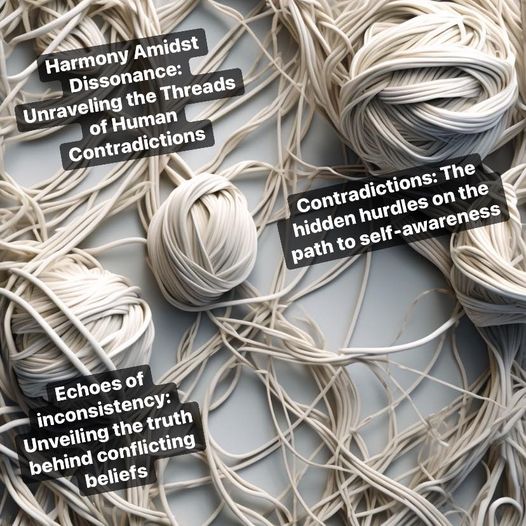
Many individuals traverse their entire lives contending with contradictions. At one moment, people delve into discussions within a specific context, only to express opinions that contradict their earlier statements in a different setting.
Consider a person advocating for the preservation of cultural heritage in discussions about the arts, extolling the richness and diversity it brings to society. However, in a business-oriented context, that very individual might endorse cost-cutting measures inadvertently undermining support for cultural initiatives, akin to a contradictory stroke on the canvas of their beliefs.
In the realm of climate change, someone may fervently champion environmental conservation, emphasizing the urgency of sustainable practices. Yet, in a separate conversation about economic development, this person might support policies prioritizing short-term gains over long-term environmental considerations, portraying a delicate dance between the green foliage of conservation advocacy and the stark realities of economics.
Additionally, picture a passionate advocate for human rights arguing for inclusive policies that ensure equality, dignity, and fair treatment. However, in discussions about national security, foreign policy, or immigration, this same individual might support measures inadvertently contributing to the dehumanization of certain groups, weaving a complex tapestry where the threads of advocacy and dehumanization intertwine.
These examples underscore the intricate interplay of beliefs, values, and contexts within the human experience, depicting individuals as dynamic canvases or intricate clock mechanisms navigating the complex landscape of contradictory perspectives. Over time, inconsistencies are also frequently uncovered in every book or laws crafted by humans. In verse 4:82 of the Quran, the Almighty emphasizes that if this book were of human origin, surely numerous contradictions would be evident within it.
When interacting with others, it proves valuable to highlight their contradictions, encouraging them to reflect and align their thoughts. Contradictions pose a significant challenge for humans, persisting in various aspects of life. These inconsistencies, particularly during conflicts, lead us to focus solely on someone’s faults, overlooking the underlying toot causes or truth. Contradictions manifest in attitudes, moral values, actions, and extend to both religious and worldly matters.
Achieving harmony requires a deliberate effort to eliminate contradictions from our thinking and behavior. Regular self-evaluation becomes crucial, enabling us to scrutinize our beliefs and actions and actively address and rectify any contradictions. The evolution of humanity unfolds through an ongoing process of trial and error.

